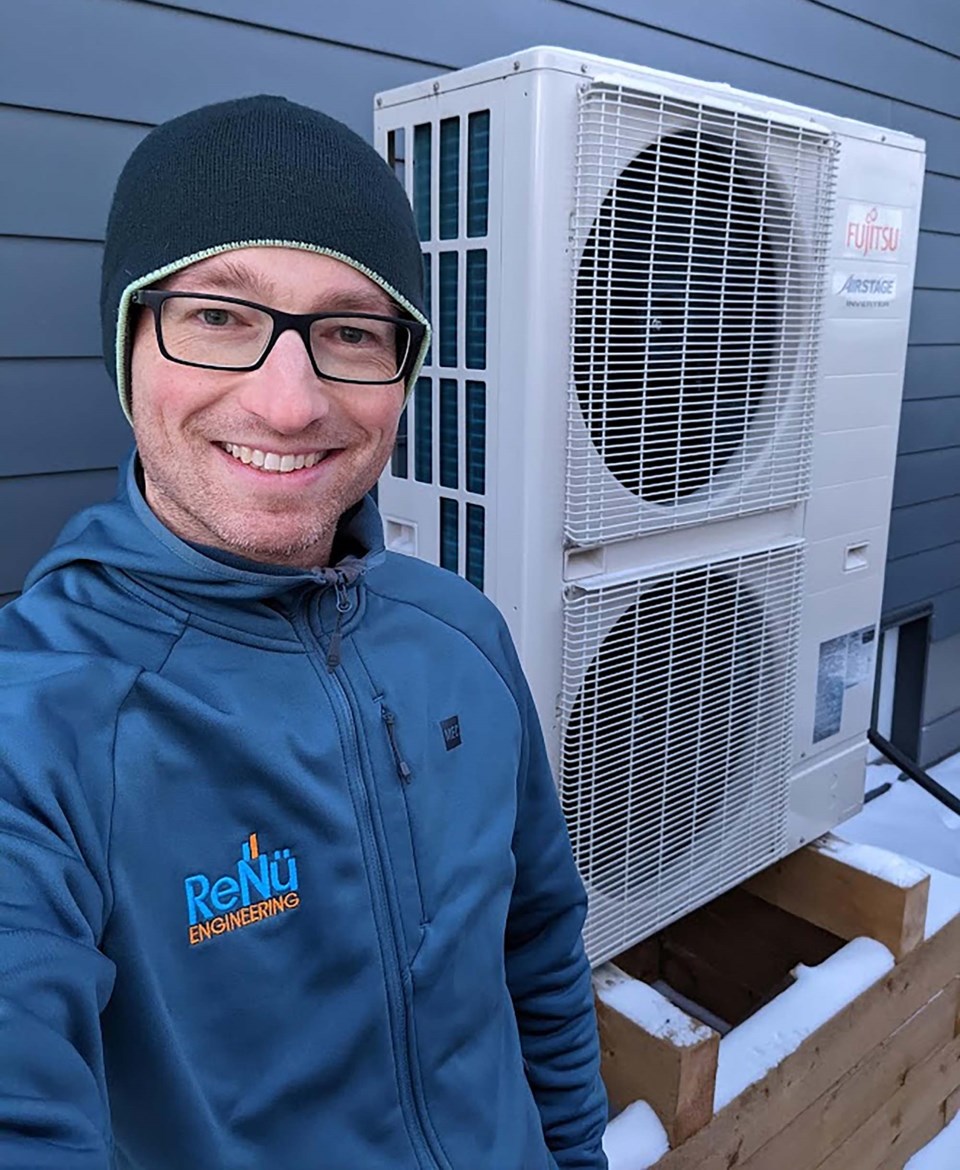This Green House
The Gazette is taking a close look at green retrofits you can fund with CEIP grants. Got a question about retrofits? Email them to [email protected]
I love heat pumps. They’re like magic boxes that suck heat from the air itself. I’ve got four in my house (dryer, fridge, freezer, air conditioner) and I bet you have one or two in yours as well.
What I don’t have is a big heat pump like the unit at Jesse Tufts’s net-zero home in Edmonton. An engineer with ReNü Engineering, Tufts added an air-source heat pump to his house in 2019, and has used it to heat and cool his home ever since.
“It keeps the entire house comfortable for less than a dollar a day,” he said of the pump’s cooling performance, and, when combined with his rooftop solar panels, prevents about 7.5 tonnes of greenhouse gas emissions a year.
“We’ve been zero carbon ever since it got activated,” he said of the pump and the panels.
Space heating and cooling accounts for about 65 per cent of a home’s energy use, reports Natural Resources Canada. We need to make that energy use carbon-free if we want to stop catastrophic global heating, and heat pumps are the best way to do so.
Why pump
St. Albert’s Clean Energy Improvement Program (CEIP) might cover efficient boilers and furnaces, but those won’t get you to net-zero — they burn gas, and that creates carbon emissions.
Tufts said you have to go for electric heating and cooling if you want to get to net-zero, as you can get electricity from carbon-free sources like wind, water, and solar. Your cheapest option here is electric heating, which might cost you $3,000 to $5,000. But unless your house has amazing levels of air sealing and insulation, you’ll spend a fortune on electricity.
For the biggest bang for your energy buck, you want a heat pump. A gas furnace is about 96 per cent efficient, while an electric heater is 100 per cent efficient, noted Leigh Bond of St. Albert’s Boundless Renewables Consulting. Air-source heat pumps are 200 per cent efficient, while ground-source ones can be 400 per cent efficient.
How? Simply put, it takes less energy to move heat than it does to make it (compare making and lighting a candle to moving that candle). Electric and gas furnaces make heat, and can never produce more heat than the energy put into them. Heat pumps move existing heat from one place to another, so you get more heat in your home per unit of energy put into the pump.
Heat pumps are pretty simple in operation, reports Natural Resources Canada. They pipe refrigerant outside to soak up heat, compress it to make it even hotter, and then run it through your home, where it dumps its heat before heading back outside. The pump works in reverse to cool your home. Air-source pumps take heat from the air, while ground-source ones pull it from the ground.
MyCEIP.ca estimates that an air-source heat pump will save the average home up to 68.15 gigajoules of natural gas a year if it replaces a gas furnace. Assuming $4/GJ (the average price in Alberta in November for natural gas) plus $2.629/GJ of gas in carbon tax and 1,928 grams CO2/cubic metre of gas (as per Alberta Environment’s Carbon Offset Emission Factors Handbook), and that your home has 100 per cent green electricity (either through rooftop panels or through your utility provider), replacing a gas furnace with an air-source heat pump should save you about $452 a year and prevent some 3.52 tonnes of annual CO2 emissions.
But which pump?
Bond said ground-source heat pumps are more efficient than air-source ones, as they have a more consistent heat source (the ground, which is always 6 C in Alberta). You have to dig up a big part of your yard to install the pump’s underground heat loops, though, which is expensive.
Ground-source make sense if you have a lot of land, a big house, and want to redo your landscaping, Tufts said. Air-source pumps are better for small, well-insulated homes, and are also easier to install and repair. While older air-source heat pumps require electric heaters as backups, the latest ones can work through Edmonton-area winters without them.
Tufts said an air-source heat pump costs $10,000 to $15,000, depending on your home’s level of insulation and whether or not you need backup electric heating. Bond said a ground-source system in a small, well-insulated home would likely cost $24,000. The one going into his house was about $70,000.
The Canada Greener Homes program offers $2,500 to $5,000 in rebates for heat pumps. Get such a rebate, and a typical air-source heat pump should pay for itself in about 11 to 28 years — sooner if gas prices and carbon taxes go up. You can finance that heat pump through CEIP or Canada Greener Homes loans.
Tufts said air-source heat pumps can be effective stepping stones for homes aiming to reach net-zero. You can install one today to eliminate 50 to 80 per cent of your natural gas use and later super-insulate your house to ditch gas entirely.
Heat pumps are wonderful devices, and I suspect they’ll become widespread in Alberta. Who would have thought that the same technology that keeps our drinks cold could also keep our homes warm?
Green Actions
Action: replace gas furnace with air-source heat pump
Cost: $10,000 to $15,000
Payback: 11 to 28 years with rebate
Savings: $452 and 3.52 tonnes CO2/year
Greener Homes rebates: $2,500 to $5,000
CEIP eligible: yes




